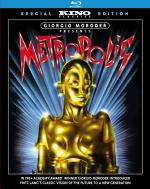|
This section contains 702 words (approx. 3 pages at 300 words per page) |

|
Although there are many different definitions of German Expressionism, all acquaint it as a theory of art that expresses feelings in an abstract way. Expressionism prevailed in the arts right after World War I, when Germany was entering a period of unrest and confusion, an almost hysteric despair coupled with the economic woes of an inflation-ridden country. German filmmakers capitalized on this strangling terror, thriving on the yearning for the fantastic, the mysterious, and the macabre.
The primary themes of expressionism are based in the human struggle to make sense of the world around us. Expressionist films deal with trying to figure out answers to our problems. There is always a fundamental sense of "wrongness" in these films, and they radiate a sense of displacement. This is manifest in Metropolis' dehumanized conflict of the owners vs. the workers. However, the end of Metropolis provides an answer. This...
|
This section contains 702 words (approx. 3 pages at 300 words per page) |

|




